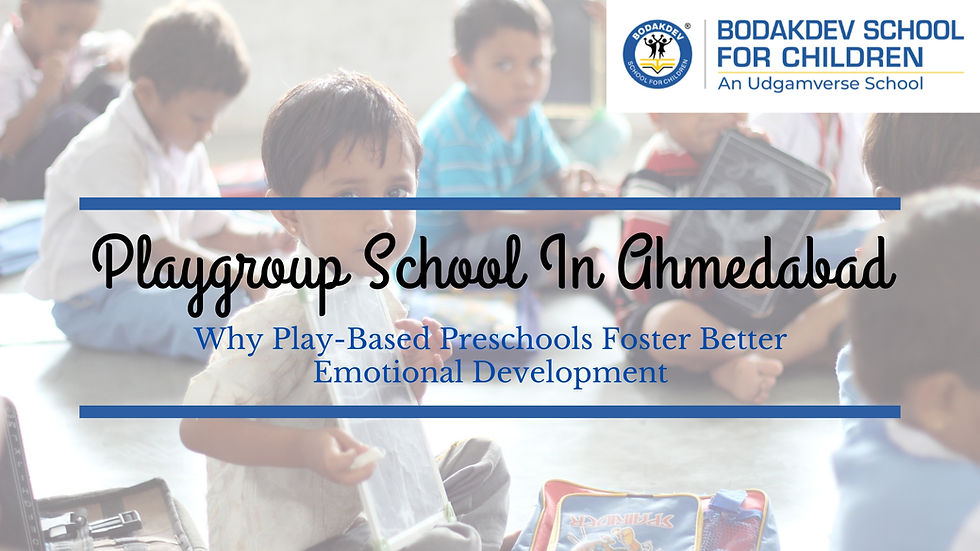Why Play-Based Preschools Foster Better Emotional Development
- Bodakdev School
- Jul 29, 2025
- 3 min read

Early childhood is a time of rapid growth—not only physically and cognitively, but emotionally as well. During these formative years, children begin to understand the world around them, make sense of their feelings, and navigate social situations. This is where a nurturing and developmentally appropriate learning environment plays a vital role. For many families, choosing a Playgroup School In Ahmedabad that emphasizes play-based learning can significantly impact a child's emotional well-being.
Unlike traditional academic-focused models that prioritize structured lessons, play-based approaches encourage exploration, self-expression, and interaction. These seemingly simple activities—building with blocks, playing dress-up, or role-playing as a shopkeeper—do far more than keep children entertained. They establish the groundwork for emotional intelligence throughout one's life.
How Play Supports Emotional Growth
Play is an effective teaching technique in addition to being enjoyable. Children encounter scenarios that call for them to communicate their emotions, work through issues, and cooperate with their peers through unstructured activities. These interactions promote essential emotional skills, including:
Empathy: Understanding how others feel during group play or while sharing toys.
Self-regulation: Learning to wait for a turn or managing frustration when things don’t go as planned.
Confidence: Feeling capable and valued when making choices and expressing ideas.
Resilience: Bouncing back from setbacks during games or social conflicts.
In a play-based environment, educators act more as facilitators than instructors. They observe, guide, and support children in navigating emotional challenges rather than controlling the experience. This empowers kids to explore their feelings safely and independently.
It now makes perfect sense that pre-schools in Ahmedabad that use an exploratory, child-led approach are becoming more and more popular.. Parents are increasingly seeking programs that not only prepare children academically but also nurture their emotional and social capacities.
The Role of Imagination and Role-Play
Imaginative play—where children pretend to be doctors, animals, chefs, or superheroes—is a crucial component of emotional development. These role-playing activities give children the opportunity to “try on” different perspectives and express their emotions in a symbolic, non-threatening way.
For example, a child pretending to comfort a crying doll might be processing their own experience of needing comfort. These creative scenarios help children make sense of emotions and develop coping strategies for real-life situations.
Group role-play also encourages negotiation and compromise. As children agree on roles or storylines, they practice communication and learn how to express their needs while considering others' viewpoints.
Building Social Bonds and Reducing Anxiety
The transition from home to a larger group setting can be overwhelming for young children. A play-oriented setup can ease this transition by creating a familiar, low-pressure environment where relationships are formed naturally.
When children play together, they learn how to initiate conversations, cooperate, and resolve disagreements. These social skills form the basis for emotional security and confidence in peer settings. Over time, kids learn to trust others, express their feelings more clearly, and engage in meaningful relationships.
Another significant benefit is reduced anxiety. A playful environment feels safe and supportive, allowing children to explore without the fear of being wrong. This freedom encourages experimentation and helps reduce performance pressure, which can be especially important in the early years.
By this stage, many parents searching for the Best Preschool Near Me are specifically looking for environments where emotional safety, peer bonding, and expressive activities are prioritized over rigid academic drills.
Language and Emotion Go Hand-in-Hand
Language development and emotional expression are deeply connected. Through storytelling, singing, and pretend play, children expand their vocabulary—not just for everyday objects but also for complex emotions. Being able to label feelings like “frustrated,” “excited,” or “lonely” helps children articulate their experiences rather than act them out through tantrums or withdrawal.
Educators in play-based settings often use reflective language to model emotional expression. For example, a teacher might say, “It looks like you’re feeling upset because your tower fell,” helping the child recognize and name their emotion. These small moments create long-term impact, teaching emotional awareness and communication.
Conclusion
The early years are more than just preparation for formal education—they are the foundation for emotional strength, resilience, and relationship-building. A play-based approach respects a child’s natural curiosity while gently guiding them through the complexities of feelings, friendships, and self-expression.
For families evaluating the right Pre School In Ahmedabad, it's essential to look beyond just academic reputation. Equally important and deserving of serious consideration is emotional growth. Children can acquire the emotional skills they'll need for the rest of their life in an environment that fosters creativity, empathy, and social connection.
Choosing play as a foundation isn’t a compromise on learning—it’s a thoughtful, research-backed way to ensure children grow up emotionally grounded, confident, and ready to face the world with a healthy sense of self.

Comments